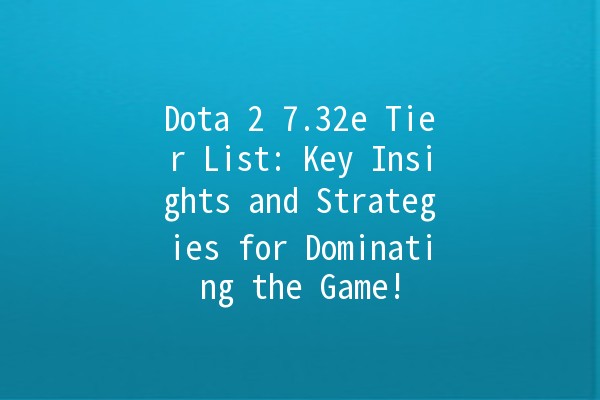Dota 2 remains one of the most strategic and competitive games in the world, and with each patch, the meta shifts, impacting the tier list of heroes. The latest patch, 7.32e, introduces various changes that players need to adapt to in order to succeed. This article dives deep into the current tier list, detailing significant hero strengths, weaknesses, and practical advice to enhance your gameplay.
Understanding the Importance of the Tier List
The tier list for Dota 2 is a ranked set of heroes based on their current effectiveness in the game. This hierarchy can greatly influence players' choices during hero selection, determining which champions to play or counter. Each hero's rank reflects their viability in both professional play and casual matches, incorporating recent changes from patches, the synergy with other heroes, and their impact on the game.
Tiers Explained
S Tier : These heroes are exceptionally powerful and can singlehandedly dominate a game.
A Tier
B Tier
C Tier : Often considered situational picks and generally not recommended unless trying unconventional strategies.
D Tier

The Current Tier List for Dota 2 7.32e
S Tier Heroes
Strengths
Usage: Pangolier excels in both offlane and support roles, offering great utility through his shield crash and swashbuckle.
Strengths: Exceptional physical damage output combined with utility, very effective in both early and late game.
Usage : Marci's ability to engage with Unleash makes her a formidable force in team fights.
A Tier Heroes
Strengths: Incredible in terms of skill ceiling and versatility; can play multiple roles effectively.
Usage: Mastering Invoker can significantly enhance your team's tactical options in both farming and fighting phases.
Strengths : Durable with high sustainability; can push lanes and take towers easily.
Usage: Dragon Knight can shift between a tanky initiator and a damage dealer, making him a reliable pick in different situations.
B Tier Heroes
Strengths
Usage: Kunkka requires good positioning but can turn the tides of battle with his ultimate.
Strengths: High mobility and scaling potential that allows him to counter spelldependent heroes effectively.
Usage: AntiMage shines in lategame strategies, punishing enemies heavily reliant on abilities.
C Tier Heroes
Strengths : While he offers commendable utility and healing, he requires heavy coordination with the team.
Usage : Utilize Keeper for strategic plays that provide energy restoration for heavy mana heroes.
Strengths
Usage : Best suited for a team that can protect him in the early phases, allowing him to scale into the midgame.
D Tier Heroes
Strengths: Unique playstyle allows for innovative strategies.
Weakness
Weakness: Struggles against many newer heroes with mobility and control spells making him less effective.
Tips for Maximizing Your Performance
Understanding the strengths and weaknesses of each hero in relation to your chosen hero is crucial.
Example
Good farming habits can improve your overall gold and experience gain.
Example
Communicate with your team to ensure effective execution of strategies.
Example
Map control through wards and sentries can prevent ambushes and secure objectives.
Example : As a support player, prioritize placing vision in key areas like Roshan and enemy jungles to track movements and secure objectives.
Choosing the right items relevant to the game context is vital.
Example: If facing heavy magic damage, heroes like Kunkka should consider purchasing a Black King Bar to negate control spells during engagements.
Frequently Asked Questions
S Tier heroes dominate primarily due to their high win rates and adaptability across different drafting scenarios. They often possess versatile abilities that make them effective in team fights, securing kills, and controlling objectives.
The tier list is updated frequently following patches and significant changes to heroes and items. It is essential for players to keep abreast of patch notes and adjust their hero choices according to the current meta.
Yes, while higherranked players may adopt different strategies compared to casual players, tier lists serve as a general guide for understanding hero effectiveness. However, player skill and familiarity with heroes can trump tier lists in determining success.
New players should use the tier list to familiarize themselves with strong heroes and their abilities, ensuring they select heroes that can have immediate impacts. Practicing S and A Tier heroes can also provide a better introduction to gameplay mechanics.
Map awareness helps players avoid dangerous situations and seize opportunities for objectives or kills. Players should always be checking the minimap to monitor enemy movements and adjust their strategies accordingly.
Focus on reviewing your games to identify misplays and opportunities. Watching professional matches can also help players learn better decisionmaking and gameplay strategies, particularly regarding positioning and timing during engagements.
Engaging with the Meta
The evolving nature of Dota 2 means players must continuously adapt their strategies to the everchanging environment. Understanding the tier list is just one piece of the puzzle in mastering the game. By honing their skills and staying informed about updates, players can improve their competitive edge and enhance their overall gameplay experience.
Use this article to navigate the Dota 2 landscape, and ensure you’re prepared to climb the rankings by making informed hero choices, perfecting itemization techniques, and coordinating effectively with your team!